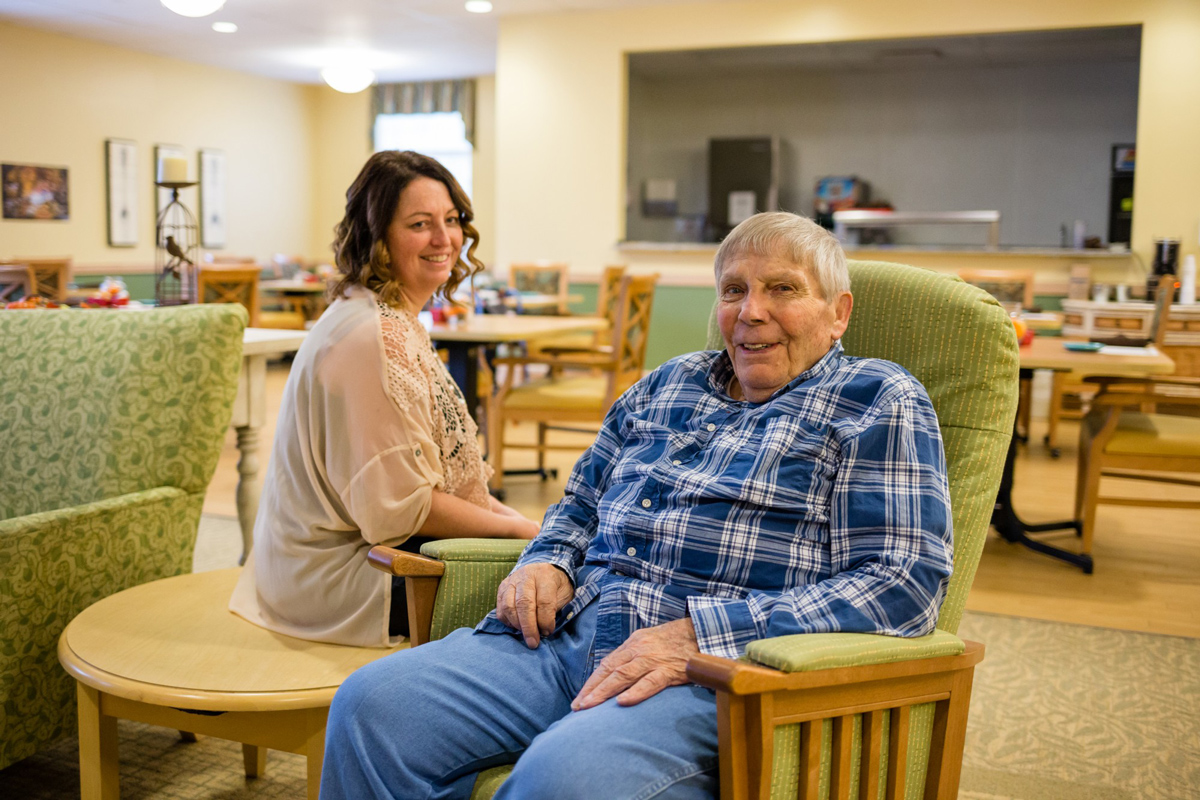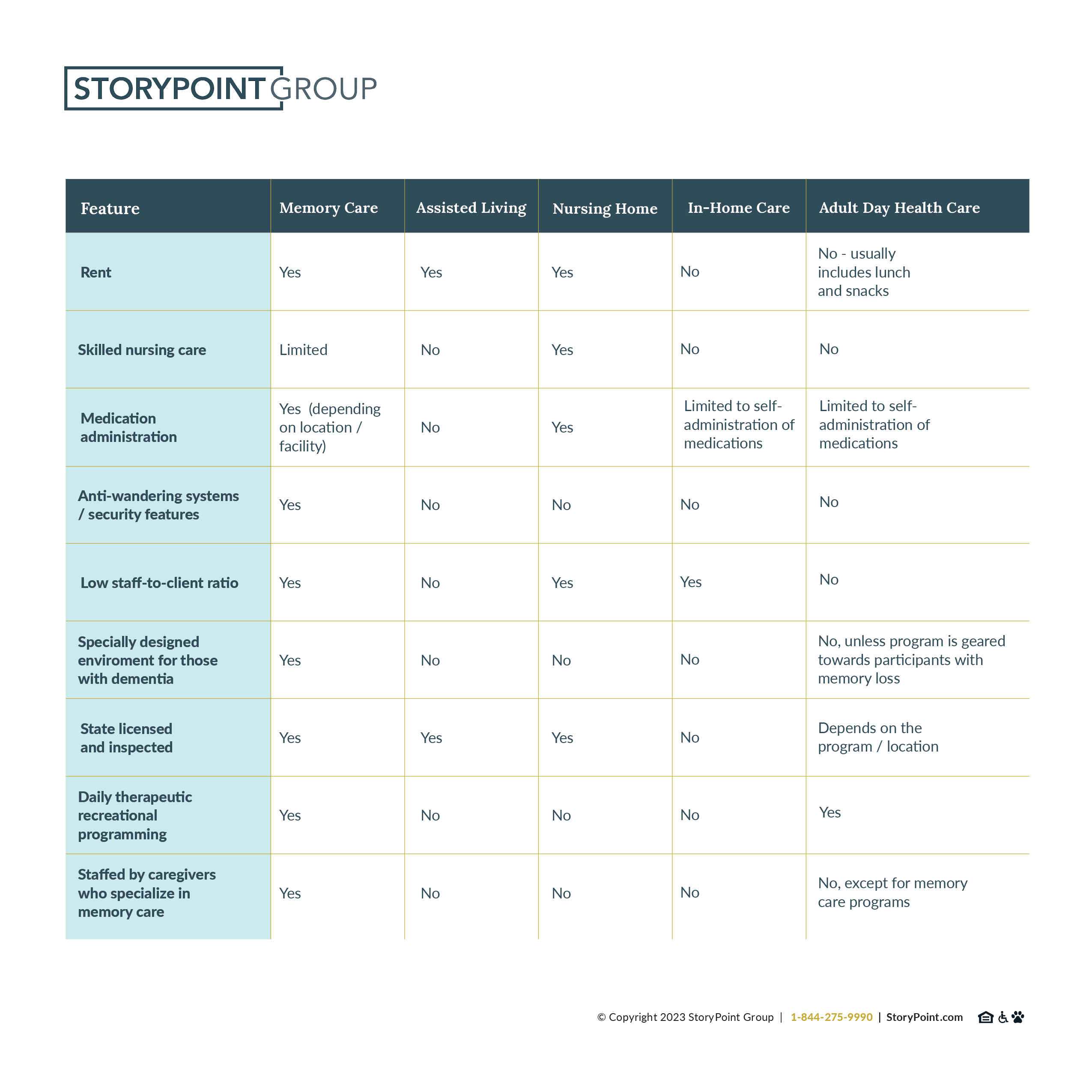Sometimes the natural effects of aging may lead to a decline in memory function among seniors. This may lead to memory impairments like Alzheimer’s and other forms of dementia. At StoryPoint Group, we understand that the unique needs that come with memory loss can make caring for a loved one with memory impairments emotionally overwhelming and stressful. Know that you’re not alone in this journey. Our expert guide is here to help you learn all you need to know about memory care services — so you can find the best care for your loved one’s unique needs.
What Is Memory Care?
Memory care is a long-term care community that’s specifically designed to care for people with memory impairments. Unlike residents in assisted living, people in memory care often require specialized care. To help ensure each resident’s needs are met, most communities are thoughtfully designed with this in mind and have specially-trained, caring employees who understand the unique needs of these residents.
When Is It Time To Consider Memory Care?
Sometimes it may not always be obvious when a loved one could use specialized help. Here are a few key signs that it’s time to consider memory care:
- Changes in mood and behavior: Sometimes memory loss may lead to changes in emotions, which can lead to increased irritability, anxiety or depression.
- Neglected hygiene: They’re forgetting to take out the trash or repeatedly have spoiled food in the fridge.
- Wandering and confusion: Sometimes memory loss can lead to confusion about time, place or people.
- Safety concerns: Memory impairment can lead to loss of balance, which can result in unexpected falls.
- Caregiver stress: Caring for a person with a memory impairment can be emotionally draining. If taking care of your loved one is becoming overwhelming, it may be time to consider memory care services.

Common Memory Care Services
Memory care communities are designed to provide specialized and compassionate care to individuals living with Alzheimer’s disease or other forms of dementia. Here are some of the key services offered in memory care:
- 24/7 supervision: Trained employees offer round-the-clock monitoring to help ensure residents’ safety and well-being.
- Personalized care plans: Each resident is unique, and their needs and preferences may vary. Some communities create personalized care plans tailored to the individual, taking into account their abilities and challenges.
- Memory-stimulating activities: Communities typically have a fun activity calendar full of engaging things to do, such as art and music therapy, designed to stimulate residents’ memory and cognitive function.
- Secure environment: Surroundings in memory care communities are specifically designed with the unique needs of memory care residents in mind. Living spaces typically feature thoughtfully designed elements, such as high ceilings and enlarged windows, to combat the effects of memory loss and dementia. Most communities also have security measures in place so residents can move around freely without any danger of wandering off.
- Nutritious meals: Proper nutrition is essential for maintaining good health. Most communities provide carefully planned, delicious and nutritious meals.
- Medication management: Specially trained employees are on site to help residents manage their medications, ensuring they receive the right doses at the right times.
- Emotional support: Living with dementia can be emotionally challenging. Some memory care communities offer emotional support not only to residents, but also to their families to help them navigate the difficult journey.
Understanding The Cost Of Memory Care
The average cost of memory care can vary significantly depending on several key factors, such as location, your loved one’s needs, amenities provided by the facility and more. On average, you can expect to pay between $4,000 and $7,000 per month in the United States. This cost is generally higher than assisted living due to the specialized care and support provided to individuals with memory-related conditions.
Use The StoryPoint Group Cost Calculator
Our cost calculator is here to help you get an estimate of the cost of memory care where you live:
How To Choose A Memory Care Community
Memory care communities offer a diverse range of amenities and services, which can make choosing a care community for a family member overwhelming. Before making the final decision, it’s generally advisable that you tour as many communities as you can to compare your options.
Here are some key considerations to help you find a supportive community that aligns with your loved one’s unique needs:
Community Employees
What is the ratio of caregivers to residents? Observe how the employees are interacting with other residents. Are they caring and friendly? It’s advisable that you choose a community with qualified employees to help ensure that your loved one’s unique needs are met.
Budget
Memory care can be a big financial commitment for you and your family. It’s best to research and understand the cost and how it fits into your financial plans.
Meals And Nutrition
A healthy, balanced diet is important for good health. Before choosing a care community, schedule an in-person tour and assess the quality of the meals provided to ensure they’re delicious, nutritious and accommodate your loved one’s dietary needs.
Safety And Security
Due to the unique needs of people with memory impairments, most memory care communities provide a safe environment. When touring a community, ask what security measures and emergency procedures they have in place to help ensure residents’ safety.
Activity Calendar
Exercise is good for both physical and psychological well-being. Check out the activity calendar to see if the community provides meaningful and enriching activities for your loved one to enjoy.
Location
When choosing a care community for a parent, consider its proximity to other family members and friends. Being close to loved ones can be comforting for both you and your parent.

Memory Care Compared To Other Living Options
While memory care may share some similarities with assisted living and other care communities, there are some distinct differences, as shown in the chart below:
Senior Living Options Comparison Guide | Click To Download
What Are StoryPoint Memory Care Communities Like?
If your loved one has a memory impairment such as Alzheimer’s disease or dementia, know that you’re not alone in navigating this stage of their unique journey. We’re here to guide you and help you find the right care for them.
- All of our memory care communities are licensed and secure. Our communities are specially designed for those experiencing memory impairments, and our professionally trained employees are here to support your loved ones and help them make the most of every day.
- Every employee in our communities is specially trained to assist with challenges associated with memory loss.
- We plan daily activities to meet our residents where they’re at. Activities are always clear and descriptive, and provide opportunities for residents to engage with others and feel a sense of purpose.
- Our Executive Chefs and culinary teams get to know our residents and families to learn what foods mean the most to those we serve. Dishes contrast as much as possible with the food being served to make the items as easy to identify as possible, and we always have multiple meal options available.

Give Your Loved One The Care They Deserve
At StoryPoint Group, your loved one’s unique journey matters to us. We understand that every resident is different, and that’s why we go the extra mile to get to know them on a deep level. If you want to get an inside look at what life is like with us, schedule a tour of a community near you or call us today at 1-844-275-9990.















